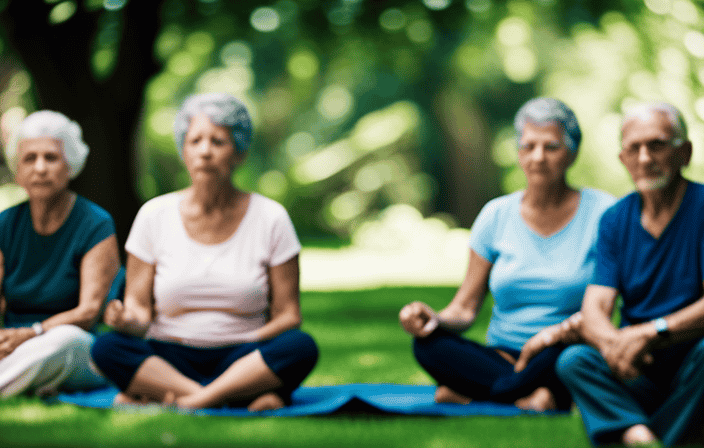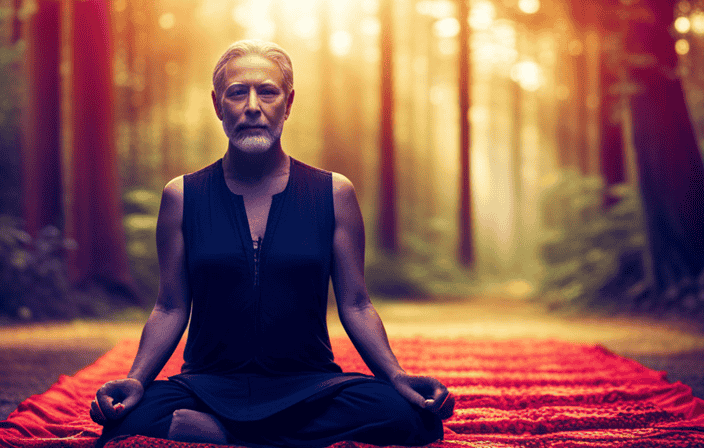Did you know that meditation provides numerous benefits for elderly individuals in reducing the discomforts linked to aging?
In fact, studies have shown that regular meditation can slow down brain degeneration, enhance digestion, and develop a sharp and focused mind.
It can also manage moods and emotions, promote relaxation and calmness, and even slow the progression of Alzheimer’s and dementia.
In this article, we will explore the various mental and relaxation benefits of meditation for seniors, as well as different types of meditation and mind-body exercises that can be incorporated into their daily routine.
Key Takeaways
- Meditation for seniors can slow down brain degeneration and improve cognitive function.
- It helps manage moods and emotions, reducing anxiety, stress, and depression.
- Meditation promotes relaxation and calmness, providing relief from daily stressors.
- Different types of meditation, such as mindfulness meditation and guided imagery, offer various techniques to achieve mental well-being.
What is it?
Meditation is a practice that involves focusing one’s attention and eliminating the stream of thoughts in order to achieve a state of mental clarity and relaxation. For seniors, meditation offers numerous benefits that can improve their well-being in old age.
It slows down brain degeneration, enhances digestion, and develops a sharp and focused mind. Additionally, it helps manage moods and emotions, promotes relaxation and calmness, and may even slow the progression of Alzheimer’s and dementia. Combining meditation with breath-control exercises can be particularly beneficial.
Moreover, meditation helps with anxiety, stress, and depression, improves memory recall and processing speed, and enhances overall cognition. It also improves digestion, increases oxygen uptake in the blood, boosts the immune system and lung health, and provides relief from digestive problems.
Ultimately, meditation plays a crucial role in enhancing the overall well-being of seniors.
Mental Health Benefits
Calming the mind through meditation can lead to the restructuring of the brain, including the shrinking of areas associated with stress, worry, and anxiety. For seniors, this can have significant benefits for their mental health.
Meditation has been shown to improve emotional well-being by helping individuals manage stress and anxiety. By practicing meditation regularly, seniors can enhance their ability to manage their moods and emotions, allowing them to observe these feelings without reacting to them. This sense of control and stability can contribute to a reduction in feelings of loneliness and sadness.
Additionally, meditation promotes emotional well-being by providing a break from daily stressors and promoting overall relaxation. The practice stimulates the prefrontal cortex, known as the ‘feel-good’ section of the brain, resulting in increased happiness and reduced depression.
Overall, meditation can greatly improve the mental health of seniors, allowing them to navigate the challenges of growing older with greater ease and contentment.
Relaxation Benefits
Relaxation achieved through the practice of meditation can lead to a state of tranquility and serenity, allowing individuals to experience a profound sense of inner calm and peace. The benefits of meditation in promoting calmness and enhancing overall well-being are numerous.
-
Stress reduction: Meditation helps to melt away stress and provides a break from the daily stressors of life. It slows down breathing, heart rate, and blood pressure, decreasing stress levels and promoting an overall sense of relaxation.
-
Emotional well-being: By allowing individuals to observe their emotions without reacting to them, meditation provides a sense of control and stability. It reduces feelings of loneliness and sadness, promoting emotional well-being.
-
Happiness and zest for life: Meditation stimulates the prefrontal cortex, the ‘feel-good’ section of the brain, increasing happiness and reducing depression. It also releases endorphins with analgesic qualities, renewing a zest for life and promoting overall well-being.
Incorporating meditation into daily life can have a profound impact on promoting calmness and enhancing overall well-being for seniors.
Types of Meditation
There are various techniques available for individuals to engage in the practice of meditation. Two popular forms of meditation for seniors are Transcendental Meditation and Guided Imagery.
Transcendental Meditation involves focusing on a repeated word or sound, allowing the mind to transcend thoughts and achieve a state of deep relaxation. This technique has been found to reduce stress, anxiety, and improve overall well-being.
Guided Imagery, on the other hand, involves focusing on a calming mental image, such as a peaceful beach or serene forest. This form of meditation helps seniors to visualize positive experiences and promotes relaxation and emotional well-being.
Both Transcendental Meditation and Guided Imagery can be practiced by seniors to enhance their mental and physical health, providing a sense of calmness and inner peace.
Mind-Body Exercises
Mind-body exercises such as Tai Chi, qigong, and yoga have been found to enhance physical and mental well-being in older adults. These exercises combine focused breathing with slow movements or poses, increasing flexibility, balance, and overall relaxation.
These exercises provide numerous physical benefits for seniors. By engaging in regular practice, seniors can improve their flexibility, which is important for maintaining mobility and preventing injuries. Additionally, mind-body exercises help to increase balance, which is crucial for preventing falls and maintaining independence. The slow and controlled movements involved in these exercises also promote muscle strength and joint stability.
Furthermore, mind-body exercises have been shown to improve cardiovascular health, increase lung capacity, and boost overall physical endurance. Overall, incorporating mind-body exercises into a senior’s routine can greatly contribute to their physical well-being and quality of life.
Getting Started
Transitioning from mind-body exercises, let’s explore the next step in incorporating meditation into the lives of seniors: getting started. For seniors interested in reaping the benefits of meditation, it is essential to find the right practice that suits their needs and preferences. Here are some tips to guide seniors in finding the right meditation practice for them:
-
Research different types of meditation, such as Transcendental Meditation, Mindfulness Meditation, Guided Imagery, Centering Prayer, and Body Scan, to see which resonates with them.
-
Consider attending meditation classes or workshops specifically designed for seniors to receive guidance and support.
-
Overcome common challenges in meditation as a senior by adapting the practice to individual abilities, such as using a chair for support or choosing shorter meditation sessions.
By following these tips, seniors can embark on a fulfilling meditation journey that promotes relaxation, mental well-being, and overall happiness.
To begin incorporating meditation into their daily lives, seniors can start by researching different types of meditation practices that align with their needs and preferences. Meditation offers numerous benefits for seniors, including slowing down brain degeneration, enhancing digestion, developing a sharp and focused mind, managing moods and emotions, promoting relaxation and calmness, and even potentially slowing the progression of Alzheimer’s and dementia.
There are various techniques that seniors can practice, such as Transcendental Meditation, Mindfulness Meditation, Guided Imagery, Centering Prayer, and Body Scan. Seniors can also explore mind-body exercises like Tai Chi, qigong, and yoga, which combine focused breathing with slow movements or poses.
Starting with short sessions and gradually increasing the duration, finding a quiet place to sit, and focusing on the breath are all essential steps for seniors to begin their meditation journey. Regular practice and patience will allow mindfulness to come naturally and provide the desired benefits.
The practice of meditation has been found to have a positive impact on mental health. Research shows that it can shrink the area of the brain associated with stress and anxiety by up to 50%.
For seniors with physical limitations, there are specific meditation techniques that can be incorporated into their daily routines. One such technique is the body scan. Seniors focus their attention on the sensations in different parts of their bodies. This helps them become more aware of their physical sensations and promotes relaxation.
Another beneficial technique is guided imagery. Seniors visualize calming mental images to promote a sense of calm and well-being.
It is important for seniors to find a quiet place to meditate, but meditation can be done anywhere. By incorporating meditation into their daily routines, seniors can experience the many benefits it offers, including improved mental health and overall well-being.
Transition: Now that we have explored the various benefits of meditation for seniors, let us delve into how meditation can be utilized as a pain management tool, particularly for seniors with limited mobility.
Current Subtopic: Meditation as a pain management tool, Meditation for seniors with limited mobility.
Meditation has been found to be an effective method for managing pain in seniors. By practicing mindfulness and focusing on the present moment, individuals can develop a heightened awareness of their bodies and their pain sensations. This increased awareness allows seniors to observe their pain without reacting to it, thereby reducing the overall discomfort experienced. Additionally, meditation promotes relaxation and calmness, which can help alleviate physical tension and reduce the perception of pain.
For seniors with limited mobility, meditation provides a valuable opportunity to engage in a gentle form of exercise that does not require strenuous physical activity. Whether it’s practicing mindfulness meditation while sitting or incorporating meditative movements such as those found in tai chi or qigong, seniors can experience the benefits of meditation regardless of their physical limitations.
In order to further understand the role of meditation as a pain management tool and its adaptability for seniors with limited mobility, let us examine the following table:
| Pain Management Benefits of Meditation for Seniors with Limited Mobility | Description |
|---|---|
| Increased body awareness | By focusing on the present moment, seniors can develop a heightened awareness of their bodies and their pain sensations. |
| Reduction in overall discomfort | Through observing pain without reacting to it, seniors can experience a decrease in the overall discomfort associated with their pain. |
| Promotion of relaxation and calmness | Meditation techniques promote relaxation, which can help alleviate physical tension and reduce the perception of pain. |
By incorporating meditation into their daily routine, seniors with limited mobility can find relief from pain and enhance their overall well-being.
Meditation has been shown to effectively manage pain and promote relaxation for seniors with limited mobility. For seniors who may experience physical limitations, there are specific meditation techniques that can be incorporated into their daily routines.
One technique is to focus on the breath, paying attention to the inhalation and exhalation. This simple practice can help seniors to relax, reduce stress, and alleviate physical discomfort.
Another technique is guided imagery, where seniors can imagine themselves in a peaceful and serene environment, such as a beach or a garden. This visualization can help seniors to release tension and find inner calmness.
Additionally, incorporating meditation into daily routines, such as setting aside a specific time each day for meditation, can help seniors to establish a regular practice and fully experience the benefits.
By adopting these techniques, seniors can enhance their overall well-being and find relief from the pains of growing old.
One effective technique for seniors with limited mobility is to focus on their breath, using inhalation and exhalation to promote relaxation and alleviate physical discomfort, similar to a gentle breeze soothing the body.
Meditation techniques for seniors can be easily incorporated into their daily routine. By finding a quiet place to sit and devoting a few minutes each day to meditation, seniors can experience the numerous benefits that it offers.
Whether it is practicing transcendental meditation by focusing on a repeated word or sound, or engaging in mindfulness meditation by concentrating on the present moment without judgment, seniors can find a technique that suits their preferences and abilities.
By being patient with themselves and practicing regularly, seniors can develop a sharp and focused mind, manage moods and emotions, and promote relaxation and calmness.
Incorporating meditation into their daily routine can enhance overall well-being and provide relief from the physical and mental challenges associated with growing old.
Frequently Asked Questions
Can meditation help reduce chronic pain in seniors?
Meditation, particularly mindfulness meditation, can be an alternative treatment for chronic pain in seniors. It helps manage pain by increasing awareness of bodily sensations, promoting relaxation, and reducing stress and anxiety.
Is there a specific type of meditation that is best for seniors?
Like a gentle breeze guiding them towards tranquility, meditation techniques for seniors offer a path to inner peace. Mindfulness meditation and guided imagery can be particularly beneficial for older adults. To start meditating as an older adult, find a quiet place, focus on the breath, and practice regularly.
Can meditation improve sleep quality in older adults?
Meditation can improve sleep quality in older adults by reducing anxiety and depression, thus promoting relaxation and calmness. Additionally, it can enhance cognitive function, leading to better overall well-being and improved sleep patterns.
How long does it take to see the benefits of meditation for seniors?
Reducing anxiety and improving cognitive function through meditation in seniors can take time to manifest. Consistent practice over an extended period allows for the rewiring of the brain, leading to noticeable benefits in mental well-being and cognitive abilities.
Are there any potential risks or side effects of meditation for older adults?
Potential risks or side effects of meditation for older adults are minimal and rare. However, precautions should be taken for individuals with certain conditions such as severe mental illness or trauma history. Overall, meditation is considered safe and beneficial for seniors’ mental and physical well-being.









